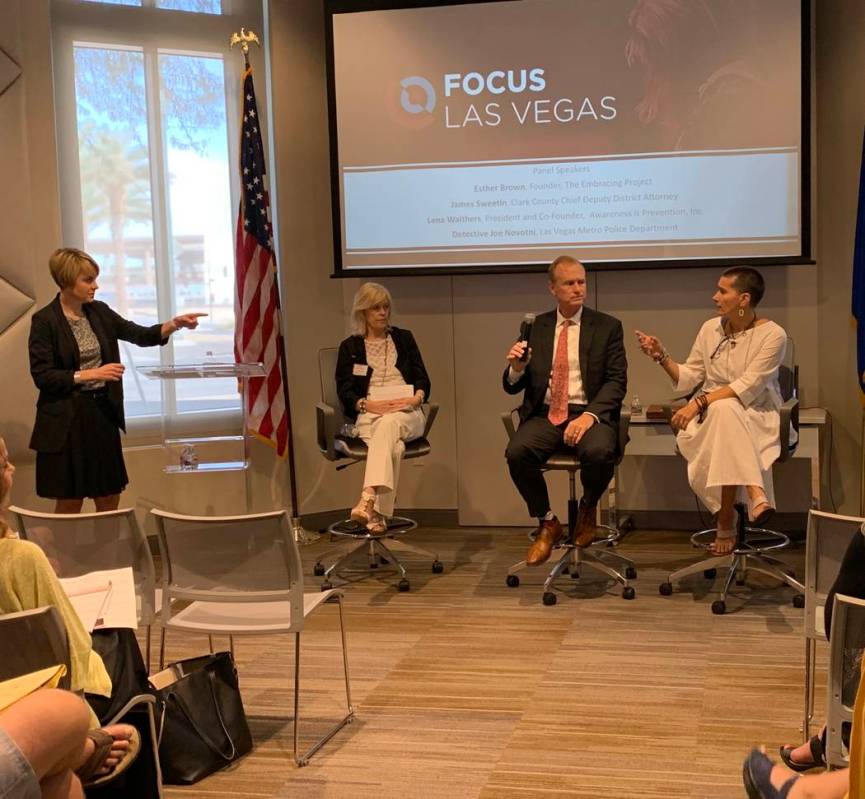Las Vegas seminar examines how to combat human trafficking

More than three dozen community advocates gathered Thursday to formulate action plans against sex trafficking by looking at both the supply and demand sides of prostitution in Las Vegas.
Organizers gave their input on how to limit human trafficking at the quarterly Focus Las Vegas meeting held by the Las Vegas Metro Chamber of Commerce.
“It really does take that village with diverse perspectives, experience and knowledge to address this problem,” said Elynne Greene, manager of human trafficking and victim services with the Metropolitan Police Department.
The department is focused on prosecuting offenders, protecting victims and preventing all forms of human trafficking, Greene said. One of Greene’s undercover vice detectives was on the panel.
Greene said that in 2018 alone, Metro identified 139 adult and 123 juvenile victims, the youngest being younger than 13. Seventy-nine of the children were local, and only 33 were found on the Strip.
“What that also tells us is that it is not localized. … It’s all over the valley,” she said. “We know there’s many more victims that have not been identified.”
Officers have started handing cards to 7-Eleven clerks in areas where there is a high number of prostitution arrests, Greene said, “because they are the eyes and ears, and if they can get them to feel a little more responsible, they can help identify.”
Greene would like the department to expand efforts to the demand side of human trafficking soon.
“We have to begin with the message that prostitution is illegal in Clark County and buying sex is a crime,” she said. “If we don’t address it from a buyer’s perspective and we don’t address the crimes being committed against the victims, we are going to have more victims.”
Esther Brown, the founder of The Embracing Project in Las Vegas, echoed Greene but said it’s much harder to address the demand side because it is believed to be tied closely to tourism.
“If we don’t talk about the men who come and buy sex with our children, we will have pimps who recruit children,” Brown said. “It’s easier to tackle the pimps than tackle demand because we live in a city driven by tourism.”
Chief Deputy District Attorney James Sweetin, a 24-year prosecutor in Clark County, explained the grooming process traffickers go through to recruit younger victims by “manipulating them” to believe there are no alternatives.
“They do whatever they can to make sure there is not an outlet available to these victims. They close that off,” Sweetin said.
Brown said her organization works closely with Sweetin to take in victims, provide schooling and trauma care, and carry them into adulthood with resources to re-enter the community. She encouraged activists to do what they could to help.
“When you are 35 and you cannot put anything on your resume, that’s very embarrassing. People will question what you were doing until the age of 35,” Brown said. “Our clients need jobs. Partner with us.”
Rachel Tabron, an audience member who said she is starting a nonprofit for trafficking victims, stumped the panelists when she asked what can be done to combat the issue when billboards across the city “promote sex.”
“What are we saying to people about what sex is and what’s OK?” she asked. “We don’t want our daughters, or someone else’s daughter, sex trafficked, but we’re promoting it.”
Contact Sabrina Schnur at sschnur@reviewjournal.com or 702-383-0278. Follow @sabrina_schnur on Twitter.